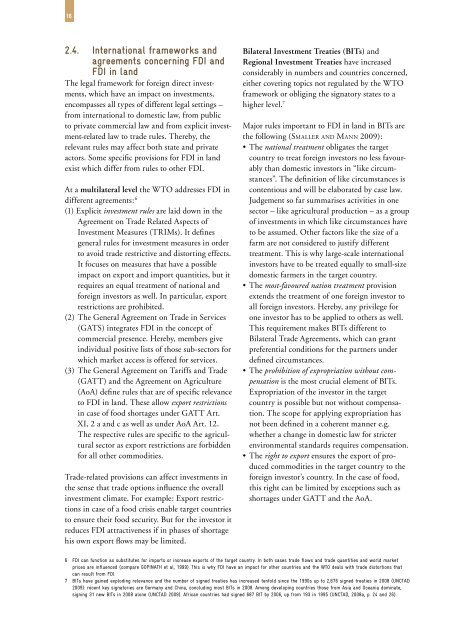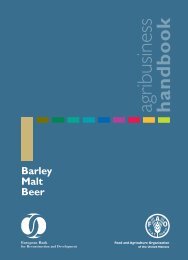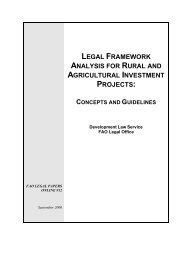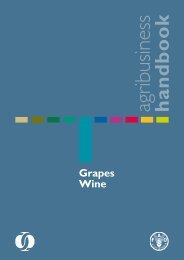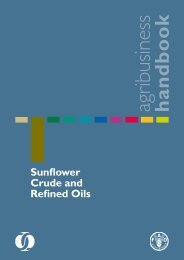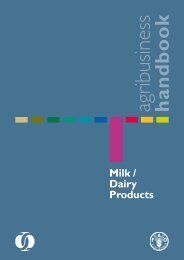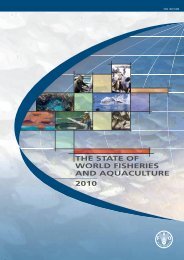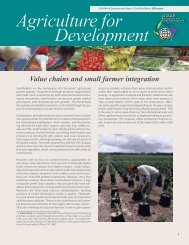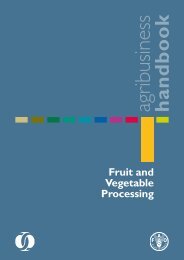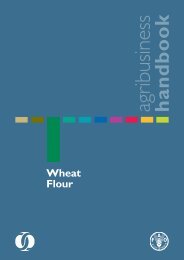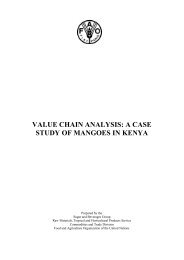Foreign Direct Investment (FDI) in Land in developing countries
Foreign Direct Investment (FDI) in Land in developing countries
Foreign Direct Investment (FDI) in Land in developing countries
- No tags were found...
You also want an ePaper? Increase the reach of your titles
YUMPU automatically turns print PDFs into web optimized ePapers that Google loves.
162.4. International frameworks andagreements concern<strong>in</strong>g <strong>FDI</strong> and<strong>FDI</strong> <strong>in</strong> landThe legal framework for foreign direct <strong>in</strong>vestments,which have an impact on <strong>in</strong>vestments,encompasses all types of different legal sett<strong>in</strong>gs –from <strong>in</strong>ternational to domestic law, from publicto private commercial law and from explicit <strong>in</strong>vestment-relatedlaw to trade rules. Thereby, therelevant rules may affect both state and privateactors. Some specific provisions for <strong>FDI</strong> <strong>in</strong> landexist which differ from rules to other <strong>FDI</strong>.At a multilateral level the WTO addresses <strong>FDI</strong> <strong>in</strong>different agreements: 6(1) Explicit <strong>in</strong>vestment rules are laid down <strong>in</strong> theAgreement on Trade Related Aspects of<strong>Investment</strong> Measures (TRIMs). It def<strong>in</strong>esgeneral rules for <strong>in</strong>vestment measures <strong>in</strong> orderto avoid trade restrictive and distort<strong>in</strong>g effects.It focuses on measures that have a possibleimpact on export and import quantities, but itrequires an equal treatment of national andforeign <strong>in</strong>vestors as well. In particular, exportrestrictions are prohibited.(2) The General Agreement on Trade <strong>in</strong> Services(GATS) <strong>in</strong>tegrates <strong>FDI</strong> <strong>in</strong> the concept ofcommercial presence. Hereby, members give<strong>in</strong>dividual positive lists of those sub-sectors forwhich market access is offered for services.(3) The General Agreement on Tariffs and Trade(GATT) and the Agreement on Agriculture(AoA) def<strong>in</strong>e rules that are of specific relevanceto <strong>FDI</strong> <strong>in</strong> land. These allow export restrictions<strong>in</strong> case of food shortages under GATT Art.XI, 2 a and c as well as under AoA Art. 12.The respective rules are specific to the agriculturalsector as export restrictions are forbiddenfor all other commodities.Trade-related provisions can affect <strong>in</strong>vestments <strong>in</strong>the sense that trade options <strong>in</strong>fluence the overall<strong>in</strong>vestment climate. For example: Export restrictions<strong>in</strong> case of a food crisis enable target <strong>countries</strong>to ensure their food security. But for the <strong>in</strong>vestor itreduces <strong>FDI</strong> attractiveness if <strong>in</strong> phases of shortagehis own export flows may be limited.Bilateral <strong>Investment</strong> Treaties (BITs) andRegional <strong>Investment</strong> Treaties have <strong>in</strong>creasedconsiderably <strong>in</strong> numbers and <strong>countries</strong> concerned,either cover<strong>in</strong>g topics not regulated by the WTOframework or oblig<strong>in</strong>g the signatory states to ahigher level. 7Major rules important to <strong>FDI</strong> <strong>in</strong> land <strong>in</strong> BITs arethe follow<strong>in</strong>g (Smaller and Mann 2009):• The national treatment obligates the targetcountry to treat foreign <strong>in</strong>vestors no less favourablythan domestic <strong>in</strong>vestors <strong>in</strong> “like circumstances”.The def<strong>in</strong>ition of like circumstances iscontentious and will be elaborated by case law.Judgement so far summarises activities <strong>in</strong> onesector – like agricultural production – as a groupof <strong>in</strong>vestments <strong>in</strong> which like circumstances haveto be assumed. Other factors like the size of afarm are not considered to justify differenttreatment. This is why large-scale <strong>in</strong>ternational<strong>in</strong>vestors have to be treated equally to small-sizedomestic farmers <strong>in</strong> the target country.• The most-favoured nation treatment provisionextends the treatment of one foreign <strong>in</strong>vestor toall foreign <strong>in</strong>vestors. Hereby, any privilege forone <strong>in</strong>vestor has to be applied to others as well.This requirement makes BITs different toBilateral Trade Agreements, which can grantpreferential conditions for the partners underdef<strong>in</strong>ed circumstances.• The prohibition of expropriation without compensationis the most crucial element of BITs.Expropriation of the <strong>in</strong>vestor <strong>in</strong> the targetcountry is possible but not without compensation.The scope for apply<strong>in</strong>g expropriation hasnot been def<strong>in</strong>ed <strong>in</strong> a coherent manner e.g.whether a change <strong>in</strong> domestic law for stricterenvironmental standards requires compensation.• The right to export ensures the export of producedcommodities <strong>in</strong> the target country to theforeign <strong>in</strong>vestor’s country. In the case of food,this right can be limited by exceptions such asshortages under GATT and the AoA.6 <strong>FDI</strong> can function as substitutes for imports or <strong>in</strong>crease exports of the target country. In both cases trade flows and trade quantities and world marketprices are <strong>in</strong>fluenced (compare GOPINATH et al, 1999). This is why <strong>FDI</strong> have an impact for other <strong>countries</strong> and the WTO deals with trade distortions thatcan result from <strong>FDI</strong>.7 BITs have ga<strong>in</strong>ed explod<strong>in</strong>g relevance and the number of signed treaties has <strong>in</strong>creased tenfold s<strong>in</strong>ce the 1990s up to 2,676 signed treaties <strong>in</strong> 2008 (UNCTAD2009): recent key signatories are Germany and Ch<strong>in</strong>a, conclud<strong>in</strong>g most BITs <strong>in</strong> 2008. Among develop<strong>in</strong>g <strong>countries</strong> those from Asia and Oceania dom<strong>in</strong>ate,sign<strong>in</strong>g 31 new BITs <strong>in</strong> 2008 alone (UNCTAD 2009). African <strong>countries</strong> had signed 687 BIT by 2006, up from 193 <strong>in</strong> 1995 (UNCTAD, 2008a, p. 24 and 26).


